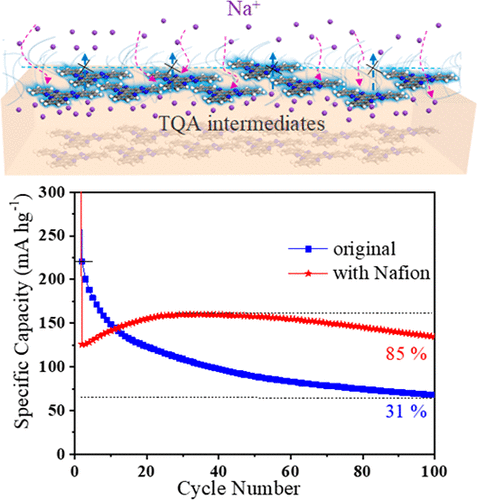当前位置:
X-MOL 学术
›
Energy Fuels
›
论文详情
Our official English website, www.x-mol.net, welcomes your
feedback! (Note: you will need to create a separate account there.)
Sodium-Ion Storage Mechanism in Triquinoxalinylene and a Strategy for Improving Electrode Stability
Energy & Fuels ( IF 5.2 ) Pub Date : 2020-03-26 , DOI: 10.1021/acs.energyfuels.0c00798 Qinglan Zhao 1 , Wei Zhao 2 , Cheng Zhang 3 , Yilan Wu 1 , Qinghong Yuan 4 , Andrew K. Whittaker 3 , X. S. Zhao 1
Energy & Fuels ( IF 5.2 ) Pub Date : 2020-03-26 , DOI: 10.1021/acs.energyfuels.0c00798 Qinglan Zhao 1 , Wei Zhao 2 , Cheng Zhang 3 , Yilan Wu 1 , Qinghong Yuan 4 , Andrew K. Whittaker 3 , X. S. Zhao 1
Affiliation

|
Sodium-ion batteries are a promising alternative to lithium-ion batteries. In particular, organic sodium-ion batteries employing environmentally friendly organic materials as electrodes are gaining increasing research interest for developing secondary batteries as a result of the ease of processing, low cost, and flexibility of the organic electrode materials. Triquinoxalinylene (TQA) is a very promising organic electrode material for sodium-ion batteries. However, the poor cycling stability of TQA is impeding its adoption as an electrode material. In this work, we investigated the sodium-ion storage mechanism in TQA and the decay in capacity using both experimental and computational means. A strategy for improving the cycling stability is proposed, and it is demonstrated that the retention of capacity can be significantly improved from 31 to 85%.
中文翻译:

三喹喔啉中的钠离子存储机理和提高电极稳定性的策略
钠离子电池是锂离子电池的有前途的替代品。特别地,由于有机电极材料的容易处理,低成本和柔性,采用环保有机材料作为电极的有机钠离子电池在开发二次电池方面获得了越来越多的研究兴趣。三喹喔啉(TQA)是一种非常有前途的钠离子电池有机电极材料。但是,TQA较差的循环稳定性阻碍了其作为电极材料的采用。在这项工作中,我们使用实验和计算手段研究了TQA中钠离子的储存机理以及容量的下降。提出了改善循环稳定性的策略,并且证明了容量保持率可以从31%显着提高到85%。
更新日期:2020-04-23
中文翻译:

三喹喔啉中的钠离子存储机理和提高电极稳定性的策略
钠离子电池是锂离子电池的有前途的替代品。特别地,由于有机电极材料的容易处理,低成本和柔性,采用环保有机材料作为电极的有机钠离子电池在开发二次电池方面获得了越来越多的研究兴趣。三喹喔啉(TQA)是一种非常有前途的钠离子电池有机电极材料。但是,TQA较差的循环稳定性阻碍了其作为电极材料的采用。在这项工作中,我们使用实验和计算手段研究了TQA中钠离子的储存机理以及容量的下降。提出了改善循环稳定性的策略,并且证明了容量保持率可以从31%显着提高到85%。











































 京公网安备 11010802027423号
京公网安备 11010802027423号